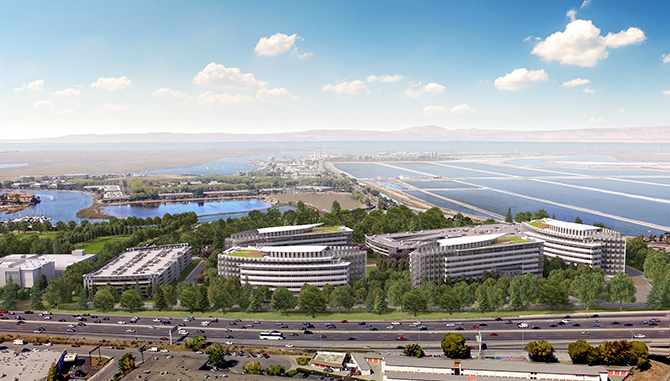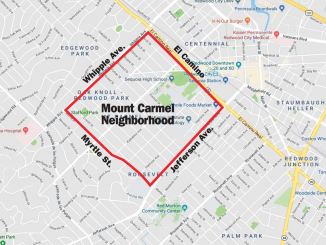
BY EMILY MIBACH
Daily Post Staff Writer
The office development that will replace Malibu Grand Prix in Redwood City will add 4,579 employees and worsen the housing-jobs imbalance by 2,043 homes, said an environmental report on the project released by the city yesterday (Jan. 16).
What’s more, the project will add 8,090 car trips, worsening traffic on the Woodside Road-Highway 101 interchange, as well as Blomquist Street, E. Bayshore Road and Seaport Boulevard.
That’s according to the draft Environmental Impact Report authored by Oakland-based consultants Environmental Science Associates. As a draft, the public can question the conclusions, and the final version will attempt to answer those conclusions. The City Council will use the final EIR to decide whether to let the 1.1 million-square-foot development called Harbor View to move forward.
As a result of the 4,579 new employees who will work in the four office buildings, 2,043 more homes will need to be built in the city to accommodate them, the report states. Since the project is all commercial with no housing, the housing need will be abated by the 1,347 homes that have been either approved or built in the city during its recent building boom, the report said.
The report said 3,333 homes will be built by 2023, according to projections by the Association of Bay Area Governments, or ABAG. Because ABAG projects that there will be a 23% increase in housing countywide by 2040, that the housing demand that may result from the new employees “wanting to live in Redwood City or elsewhere throughout the county could be adequately addressed in part by the anticipated housing units expected to be developed by 2040.”
Traffic improvements needed
San Francisco-based developer Jay Paul Co. will have to do roadwork on westbound Middlefield Road approaching Woodside Road to build two left-turn pockets, ESA recommends.
Additionally, Jay Paul will have to pay its “fair share” toward the 101-Woodside interchange, the report said, without putting a number on what that share should be.
The city’s website says the interchange project is in the “design phase.” The website says the interchange should be fully designed and funded by June 2020, with construction starting in late 2020 or early 2021. Construction is expected to take three to three and a half years.
The cost of rebuilding the interchange has been put at $142 million.
Aside from Jay Paul, the Sobrato Organization will also have to put in its “fair share” toward the interchange. Sobrato is proposing 420,000 square feet of office space and 520 apartments on Broadway where CVS is now located.
Sobrato’s “fair share” hasn’t been determined either.
The project is slated to have 3,855 parking spaces. The developer will have to create a transportation master plan so there is no overflow parking.
Comments about the draft environmental impact report, which can be found at https://bit.ly/2CtWzuE, will be accepted until March 8 and can be sent to Planning Manger Steven Turner at [email protected].
The city council will be reviewing the project on Feb. 11 at 7 p.m.




Wondering if Redwood City council will require this developer to provide housing? Don’t hold your breath. The city is owned by the developers. Thanks for pointing out how much this project will distort the housing/jobs imbalance, but the councilmembers don’t care.
Betcha “Climate” will have a cheerful story or Mark Simon column telling us how great this project will be.
This is misleading…. The “1,347 homes that have been either approved or built in the city” were to provide housing for the additional office space that has *already* been approved or built. The City’s downtown plan included a balance of new housing and new offices. You can’t double-count that housing as also being for this new project that was not part of the prior plan.
Bottom line, this project is bad for Redwood City because:
1) It is not mixed use. It is 100% office, which will make the jobs-housing imbalance much worse
2) It is not near transit. New development should be near the train and downtown — this is 100% car-oriented
3) It is not consistent with the city’s General Plan.
The interchange will cost $142 million. None of that should come from taxpayers. Every cent should come from the developers whose projects have created the traffic that makes that interchange such a disaster.